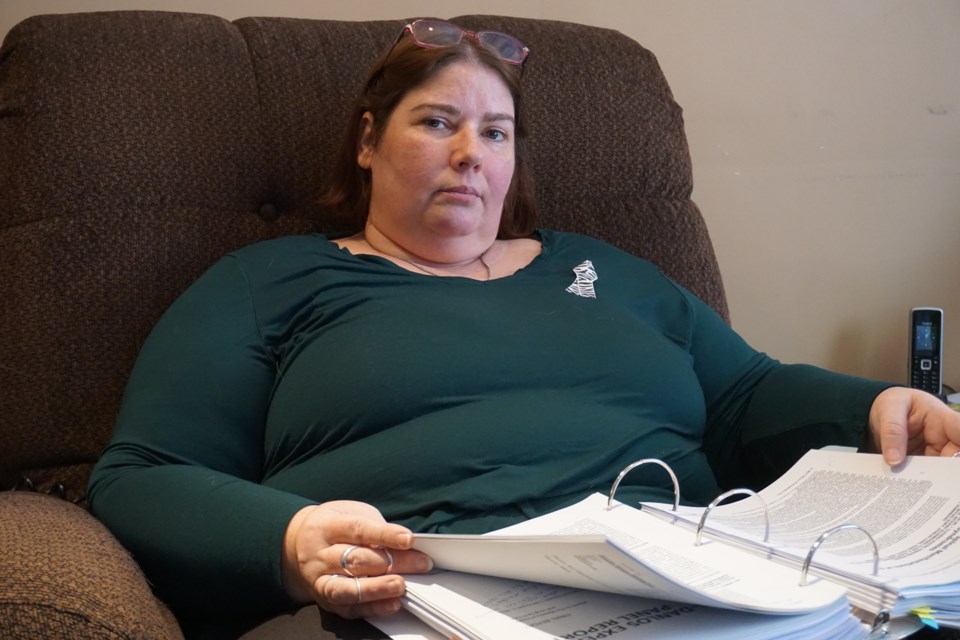A Midland woman has lost her appeal to have out-of-country healthcare costs covered by the province.
While extremely disappointed, Tammy Stadt, who suffers from a debilitating illness, said she wasn’t overly surprised to learn her appeal for compensation was denied by Ontario’s Health Services Appeal and Review Board.
“It’s very frustrating and it’s a learning process that this whole patient population is ignored,” Stadt told MidlandToday. “So much is left up the patient. It’s a system set up for failure.”
Stadt, 49, has hypermobile Ehlers-Danlos Syndrome (hEDS), which causes painful partial and full dislocations as her connective tissues don’t hold her joints together.
Last month, Stadt appeared before the board in Toronto to appeal the province’s decision not to pay for an $800 neurological consultation by an American doctor, who recommended surgery after tests confirmed nerve and tissue damage to the bladder as a result of the spinal injury.
In its ruling, the board noted that Stadt didn’t follow proper provincial health protocols, including failing to have the consultation in the United States first approved by a ‘like physician’ in Ontario.
“It’s disheartening and the other piece is as I went through this it has to be a ‘like physician,’” Stadt said, noting the irony remains that it's extremely difficult to find such a physician in the province.
“If you can’t get access through referral by a ‘like physician,’ you can’t get an acknowledgement by a ‘like physician.’”
And what’s worse for Stadt, who represented herself before the review board that heard from 13 witnesses, now finds the only avenue available involves appealing the review board’s ruling in division court within the next 30 days.
“But I can only do an appeal on the (appeal’s) process,” she said, adding that option would also involve a large outlay of money for a lawyer to oversee the appeal and noted that even finding a suitable lawyer that understands the system would be a challenge.
“Even to get an opinion, I could not find a local lawyer who had ever been to the Health Services Appeal and Review Board. It’s David versus Goliath. It doesn’t put me further ahead.”
Following the hearing, Stadt said she didn’t feel overly confident about her chances after reading an earlier story featuring Perry Brodkin.
Brodkin, who worked as OHIP’s only in-house lawyer for two decades, said the hearing system doesn’t favour the appellant.
“Ninety-eight to 99 per cent of appellants are self represented and 98 to 99 percent of appeals are denied,” he told MidlandToday during an interview last month.
Brodkin said most appellants don’t understand the standard they have to meet in order to be successful.
“A hearing before the board is the equivalent of a medical malpractice trial in court. That means that only physicians need to testify. If none of the 13 (Stadt’s witnesses) were physicians, the appeal will be denied.”
As well, Brodkin said all it takes is one mistake on the initial application for the appeal to be denied, including failure to have a specialist sign off on the out-of-country assistance request.
“You’ve got to make sure all the i’s are dotted and all the t’s are crossed,” he said, noting the appeals process makes people feel like their voices are being heard when that’s not really the case.
“No one tells appellants the facts of life. It’s unfair. It’s cruel and unusual punishment to put people like Tammy Stadt in that position.”
Stadt, who is on long-term disability from her job as a community health worker with the Barrie Community Health Centre, is truly frustrated in her quest to have her debilitating illness properly treated.
“Despite years of asking, no physician has offered me the surgical intervention I have been seeking,” says Stadt, whose primary role at her job involved assisting others in navigating the healthcare system.
“One thing I can’t do is access neurosurgery. Ehlers-Danlos Syndrome is the scarlet letter in our health-care system.”
In late 2018, she travelled to the United States for a consultation with neurologist Dr. Fraser Henderson as she grew more frustrated in her quest to have her debilitating illness properly treated.
According to Stadt, the only neurologist in the province who can perform the required surgery (Dr. Mohammed Shamji) sits in a jail cell after pleading guilty to murdering his wife in 2016.
But besides seeking the reimbursement, Stadt also used the early March hearing to outline the hoops she has had to jump through while also outlining her immediate need for surgery, which would cost about $150,000 if performed stateside.
But the three-person board wrote in its decision, "the Appeal Board finds that the consultation and proposed surgery are not
insured services under section 28.4(2) of the Regulation under the Act and therefore are not eligible for funding.
"The Appeal Board finds on the evidence of Dr. Lewis (orthopaedic surgeon and complex spine specialist) and Dr. Fehlings (a neurosurgeon) that surgery is not generally accepted by the medical profession in Ontario as appropriate for someone in the Appellant’s medical circumstances."
Stadt’s inherited condition affects the body’s connective tissues, which are responsible for supporting and structuring the skin, blood vessels, bones, and organs, according to healthline.com.
“It’s made up of cells, fibrous material, and a protein called collagen,” the site notes. “A group of genetic disorders cause Ehlers-Danlos syndrome, which results in a defect in collagen production.”



